Vodafone Organizational Behaviour: Applying Theories for Improvement
VerifiedAdded on 2024/05/23
|26
|6263
|460
Report
AI Summary
This report provides an in-depth analysis of Vodafone's organizational behaviour, applying various organizational theories, including Handy's cultural theory and French and Raven's power theory, to understand the company's culture, power dynamics, and leadership approaches. It explores the role of leaders and managers in shaping organizational culture and improving team performance, focusing on motivation through content and process theories such as Maslow's hierarchy of needs and Herzberg's two-factor theory. The report also examines the influence of politics on organizational behaviour and structure within Vodafone, and discusses strategies for enhancing team effectiveness and achieving business objectives through improved operational management and motivational techniques. It concludes by highlighting the importance of understanding organizational behaviour for continuous improvement and expansion in the market.
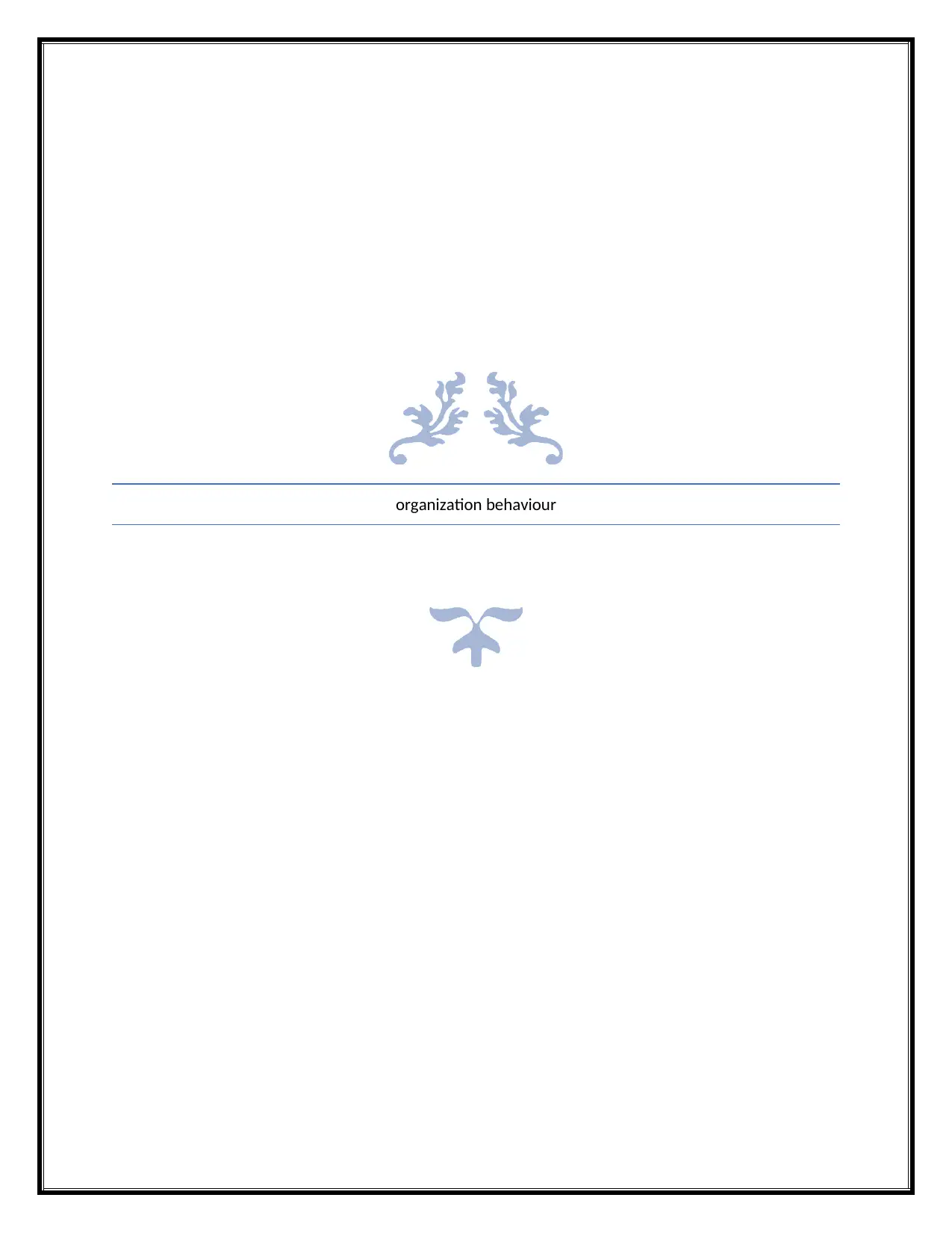
organization behaviour
Paraphrase This Document
Need a fresh take? Get an instant paraphrase of this document with our AI Paraphraser
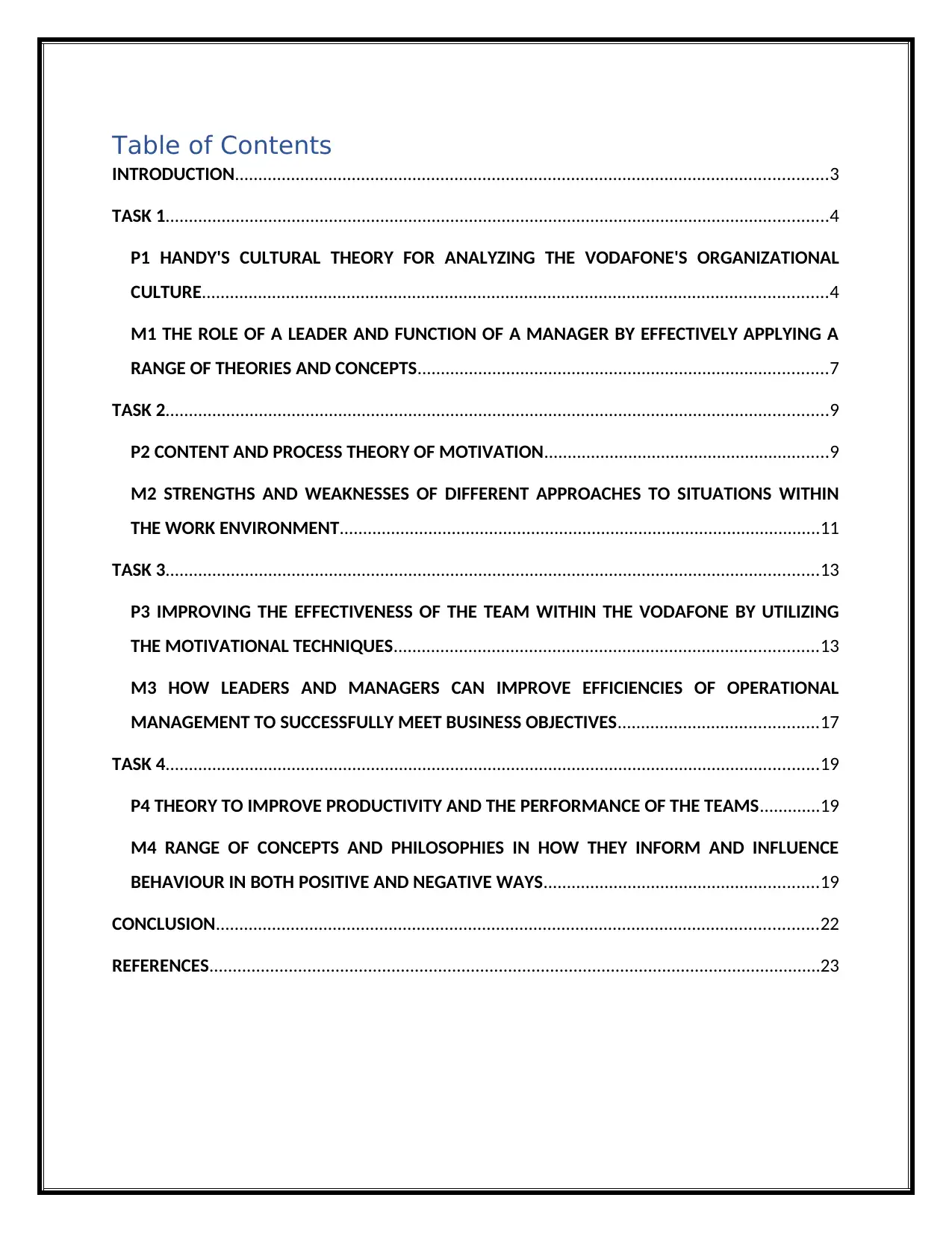
Table of Contents
INTRODUCTION...............................................................................................................................3
TASK 1..............................................................................................................................................4
P1 HANDY'S CULTURAL THEORY FOR ANALYZING THE VODAFONE'S ORGANIZATIONAL
CULTURE......................................................................................................................................4
M1 THE ROLE OF A LEADER AND FUNCTION OF A MANAGER BY EFFECTIVELY APPLYING A
RANGE OF THEORIES AND CONCEPTS........................................................................................7
TASK 2..............................................................................................................................................9
P2 CONTENT AND PROCESS THEORY OF MOTIVATION.............................................................9
M2 STRENGTHS AND WEAKNESSES OF DIFFERENT APPROACHES TO SITUATIONS WITHIN
THE WORK ENVIRONMENT.......................................................................................................11
TASK 3............................................................................................................................................13
P3 IMPROVING THE EFFECTIVENESS OF THE TEAM WITHIN THE VODAFONE BY UTILIZING
THE MOTIVATIONAL TECHNIQUES...........................................................................................13
M3 HOW LEADERS AND MANAGERS CAN IMPROVE EFFICIENCIES OF OPERATIONAL
MANAGEMENT TO SUCCESSFULLY MEET BUSINESS OBJECTIVES...........................................17
TASK 4............................................................................................................................................19
P4 THEORY TO IMPROVE PRODUCTIVITY AND THE PERFORMANCE OF THE TEAMS.............19
M4 RANGE OF CONCEPTS AND PHILOSOPHIES IN HOW THEY INFORM AND INFLUENCE
BEHAVIOUR IN BOTH POSITIVE AND NEGATIVE WAYS...........................................................19
CONCLUSION.................................................................................................................................22
REFERENCES...................................................................................................................................23
INTRODUCTION...............................................................................................................................3
TASK 1..............................................................................................................................................4
P1 HANDY'S CULTURAL THEORY FOR ANALYZING THE VODAFONE'S ORGANIZATIONAL
CULTURE......................................................................................................................................4
M1 THE ROLE OF A LEADER AND FUNCTION OF A MANAGER BY EFFECTIVELY APPLYING A
RANGE OF THEORIES AND CONCEPTS........................................................................................7
TASK 2..............................................................................................................................................9
P2 CONTENT AND PROCESS THEORY OF MOTIVATION.............................................................9
M2 STRENGTHS AND WEAKNESSES OF DIFFERENT APPROACHES TO SITUATIONS WITHIN
THE WORK ENVIRONMENT.......................................................................................................11
TASK 3............................................................................................................................................13
P3 IMPROVING THE EFFECTIVENESS OF THE TEAM WITHIN THE VODAFONE BY UTILIZING
THE MOTIVATIONAL TECHNIQUES...........................................................................................13
M3 HOW LEADERS AND MANAGERS CAN IMPROVE EFFICIENCIES OF OPERATIONAL
MANAGEMENT TO SUCCESSFULLY MEET BUSINESS OBJECTIVES...........................................17
TASK 4............................................................................................................................................19
P4 THEORY TO IMPROVE PRODUCTIVITY AND THE PERFORMANCE OF THE TEAMS.............19
M4 RANGE OF CONCEPTS AND PHILOSOPHIES IN HOW THEY INFORM AND INFLUENCE
BEHAVIOUR IN BOTH POSITIVE AND NEGATIVE WAYS...........................................................19
CONCLUSION.................................................................................................................................22
REFERENCES...................................................................................................................................23

⊘ This is a preview!⊘
Do you want full access?
Subscribe today to unlock all pages.

Trusted by 1+ million students worldwide
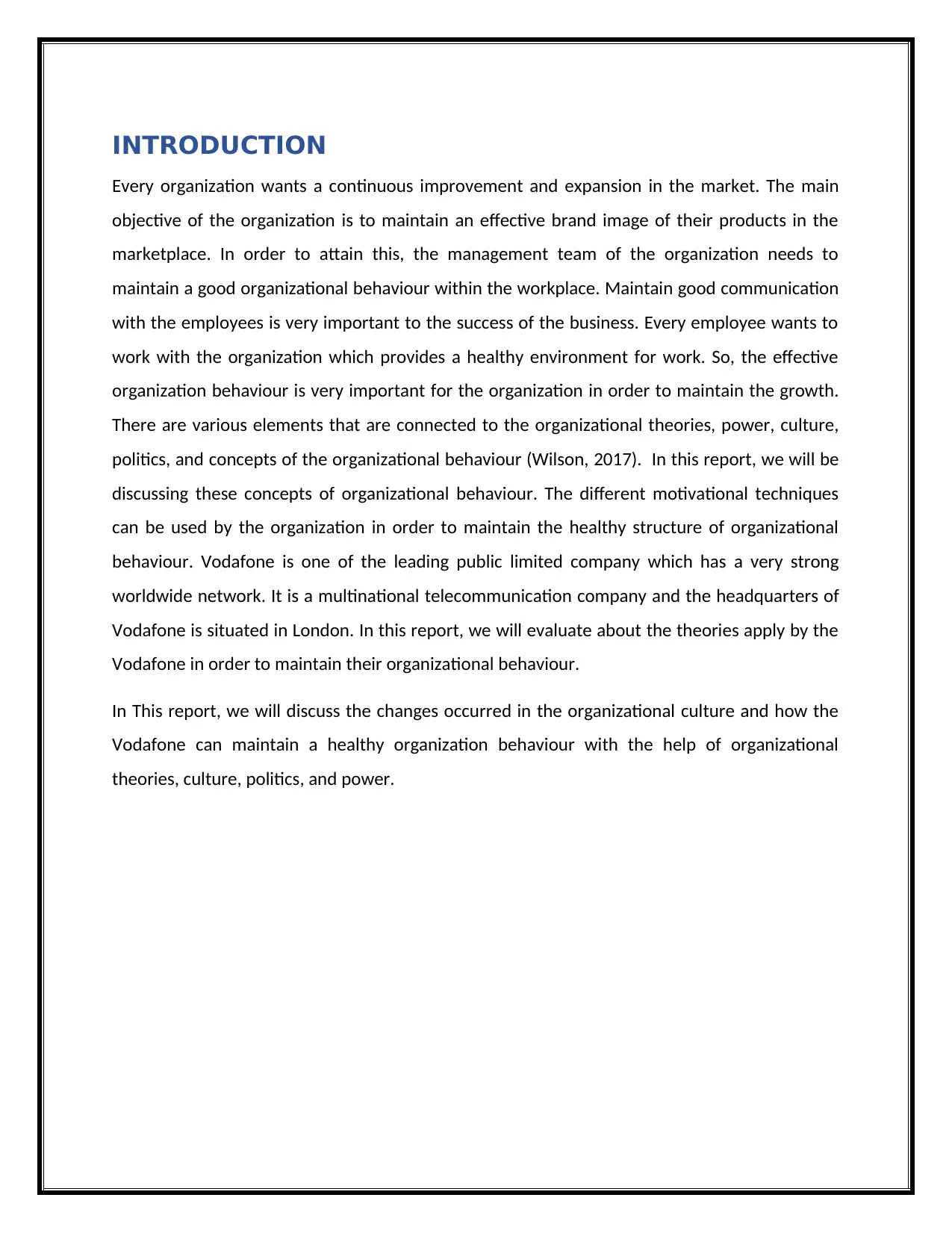
INTRODUCTION
Every organization wants a continuous improvement and expansion in the market. The main
objective of the organization is to maintain an effective brand image of their products in the
marketplace. In order to attain this, the management team of the organization needs to
maintain a good organizational behaviour within the workplace. Maintain good communication
with the employees is very important to the success of the business. Every employee wants to
work with the organization which provides a healthy environment for work. So, the effective
organization behaviour is very important for the organization in order to maintain the growth.
There are various elements that are connected to the organizational theories, power, culture,
politics, and concepts of the organizational behaviour (Wilson, 2017). In this report, we will be
discussing these concepts of organizational behaviour. The different motivational techniques
can be used by the organization in order to maintain the healthy structure of organizational
behaviour. Vodafone is one of the leading public limited company which has a very strong
worldwide network. It is a multinational telecommunication company and the headquarters of
Vodafone is situated in London. In this report, we will evaluate about the theories apply by the
Vodafone in order to maintain their organizational behaviour.
In This report, we will discuss the changes occurred in the organizational culture and how the
Vodafone can maintain a healthy organization behaviour with the help of organizational
theories, culture, politics, and power.
Every organization wants a continuous improvement and expansion in the market. The main
objective of the organization is to maintain an effective brand image of their products in the
marketplace. In order to attain this, the management team of the organization needs to
maintain a good organizational behaviour within the workplace. Maintain good communication
with the employees is very important to the success of the business. Every employee wants to
work with the organization which provides a healthy environment for work. So, the effective
organization behaviour is very important for the organization in order to maintain the growth.
There are various elements that are connected to the organizational theories, power, culture,
politics, and concepts of the organizational behaviour (Wilson, 2017). In this report, we will be
discussing these concepts of organizational behaviour. The different motivational techniques
can be used by the organization in order to maintain the healthy structure of organizational
behaviour. Vodafone is one of the leading public limited company which has a very strong
worldwide network. It is a multinational telecommunication company and the headquarters of
Vodafone is situated in London. In this report, we will evaluate about the theories apply by the
Vodafone in order to maintain their organizational behaviour.
In This report, we will discuss the changes occurred in the organizational culture and how the
Vodafone can maintain a healthy organization behaviour with the help of organizational
theories, culture, politics, and power.
Paraphrase This Document
Need a fresh take? Get an instant paraphrase of this document with our AI Paraphraser
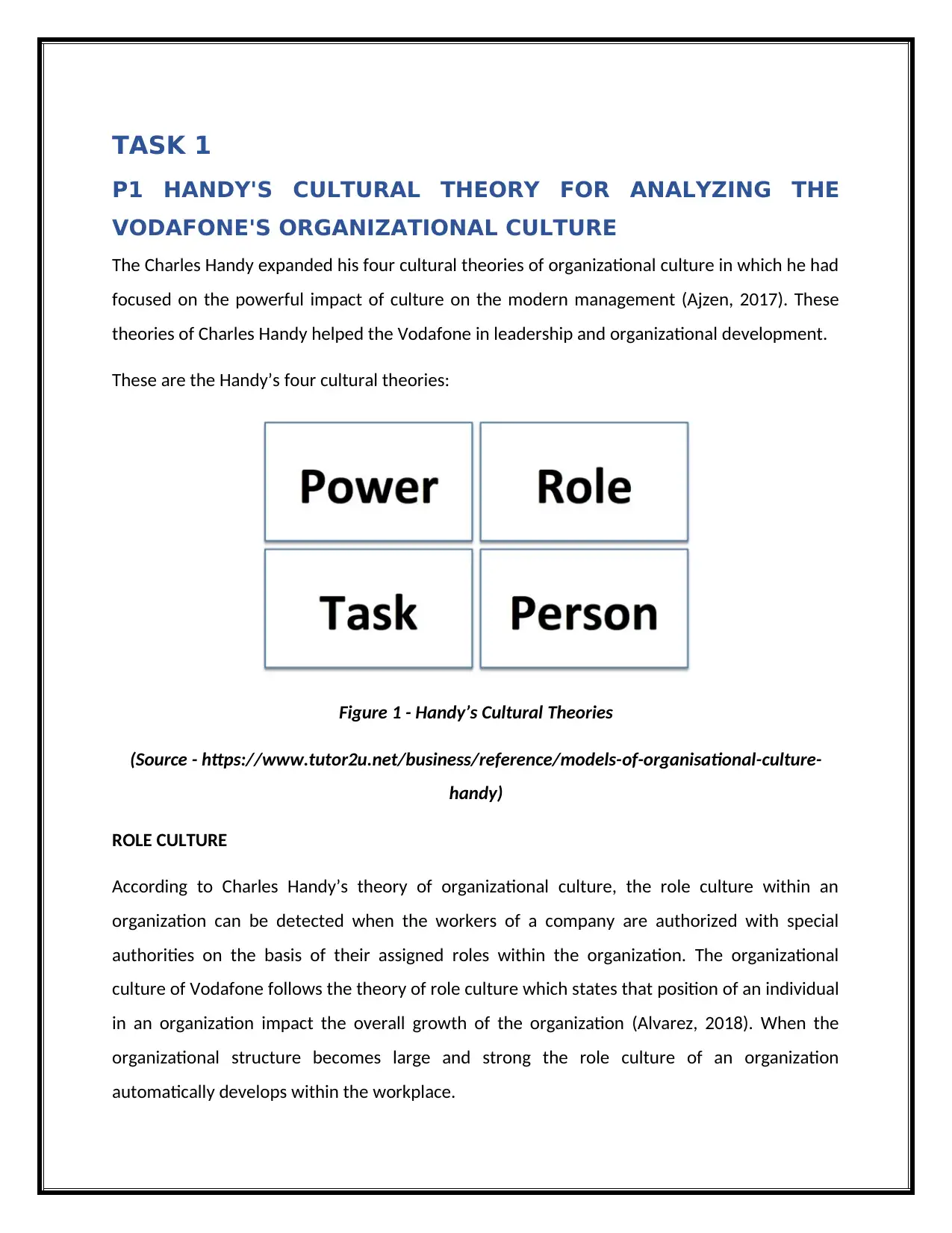
TASK 1
P1 HANDY'S CULTURAL THEORY FOR ANALYZING THE
VODAFONE'S ORGANIZATIONAL CULTURE
The Charles Handy expanded his four cultural theories of organizational culture in which he had
focused on the powerful impact of culture on the modern management (Ajzen, 2017). These
theories of Charles Handy helped the Vodafone in leadership and organizational development.
These are the Handy’s four cultural theories:
Figure 1 - Handy’s Cultural Theories
(Source - https://www.tutor2u.net/business/reference/models-of-organisational-culture-
handy)
ROLE CULTURE
According to Charles Handy’s theory of organizational culture, the role culture within an
organization can be detected when the workers of a company are authorized with special
authorities on the basis of their assigned roles within the organization. The organizational
culture of Vodafone follows the theory of role culture which states that position of an individual
in an organization impact the overall growth of the organization (Alvarez, 2018). When the
organizational structure becomes large and strong the role culture of an organization
automatically develops within the workplace.
P1 HANDY'S CULTURAL THEORY FOR ANALYZING THE
VODAFONE'S ORGANIZATIONAL CULTURE
The Charles Handy expanded his four cultural theories of organizational culture in which he had
focused on the powerful impact of culture on the modern management (Ajzen, 2017). These
theories of Charles Handy helped the Vodafone in leadership and organizational development.
These are the Handy’s four cultural theories:
Figure 1 - Handy’s Cultural Theories
(Source - https://www.tutor2u.net/business/reference/models-of-organisational-culture-
handy)
ROLE CULTURE
According to Charles Handy’s theory of organizational culture, the role culture within an
organization can be detected when the workers of a company are authorized with special
authorities on the basis of their assigned roles within the organization. The organizational
culture of Vodafone follows the theory of role culture which states that position of an individual
in an organization impact the overall growth of the organization (Alvarez, 2018). When the
organizational structure becomes large and strong the role culture of an organization
automatically develops within the workplace.
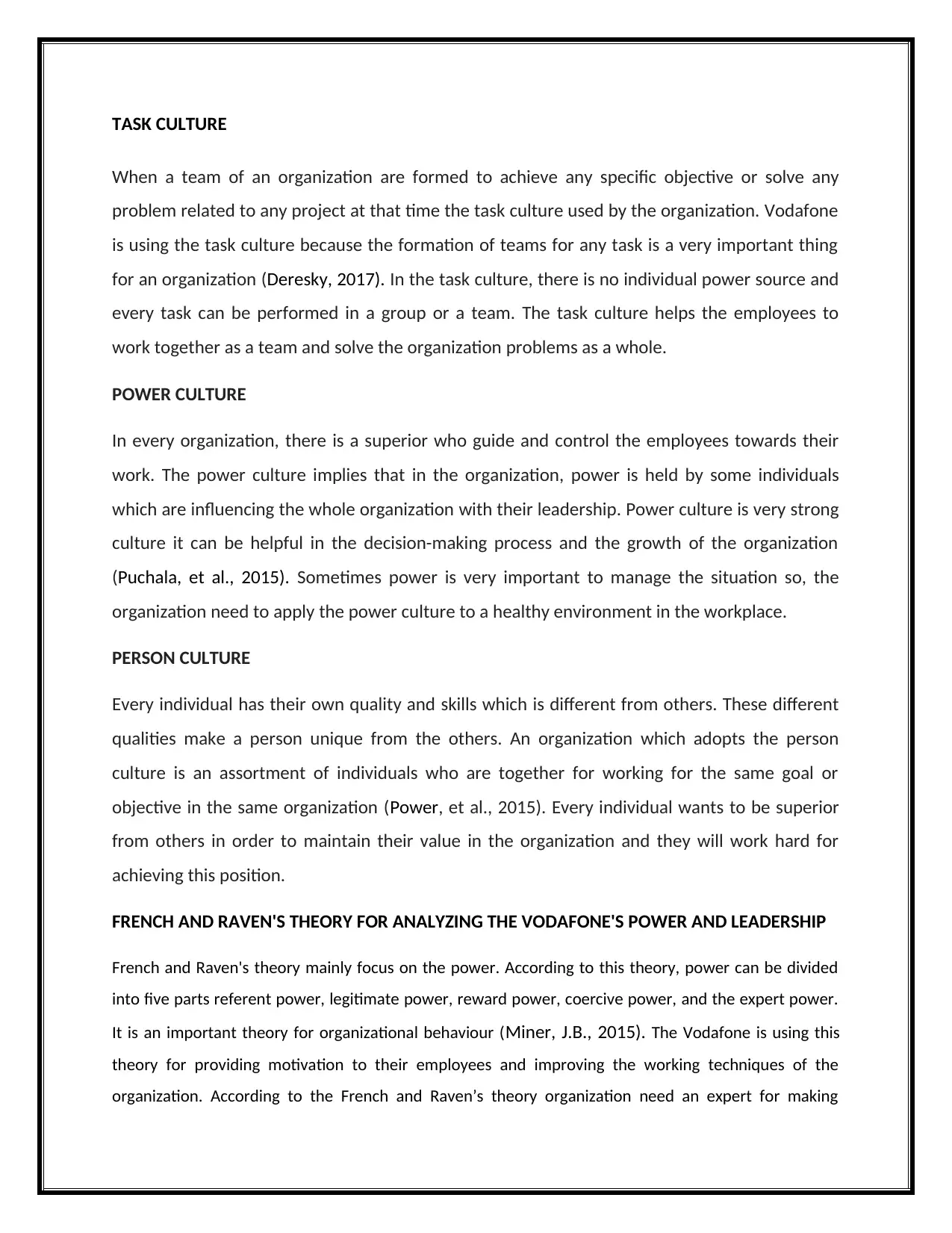
TASK CULTURE
When a team of an organization are formed to achieve any specific objective or solve any
problem related to any project at that time the task culture used by the organization. Vodafone
is using the task culture because the formation of teams for any task is a very important thing
for an organization (Deresky, 2017). In the task culture, there is no individual power source and
every task can be performed in a group or a team. The task culture helps the employees to
work together as a team and solve the organization problems as a whole.
POWER CULTURE
In every organization, there is a superior who guide and control the employees towards their
work. The power culture implies that in the organization, power is held by some individuals
which are influencing the whole organization with their leadership. Power culture is very strong
culture it can be helpful in the decision-making process and the growth of the organization
(Puchala, et al., 2015). Sometimes power is very important to manage the situation so, the
organization need to apply the power culture to a healthy environment in the workplace.
PERSON CULTURE
Every individual has their own quality and skills which is different from others. These different
qualities make a person unique from the others. An organization which adopts the person
culture is an assortment of individuals who are together for working for the same goal or
objective in the same organization (Power, et al., 2015). Every individual wants to be superior
from others in order to maintain their value in the organization and they will work hard for
achieving this position.
FRENCH AND RAVEN'S THEORY FOR ANALYZING THE VODAFONE'S POWER AND LEADERSHIP
French and Raven's theory mainly focus on the power. According to this theory, power can be divided
into five parts referent power, legitimate power, reward power, coercive power, and the expert power.
It is an important theory for organizational behaviour (Miner, J.B., 2015). The Vodafone is using this
theory for providing motivation to their employees and improving the working techniques of the
organization. According to the French and Raven’s theory organization need an expert for making
When a team of an organization are formed to achieve any specific objective or solve any
problem related to any project at that time the task culture used by the organization. Vodafone
is using the task culture because the formation of teams for any task is a very important thing
for an organization (Deresky, 2017). In the task culture, there is no individual power source and
every task can be performed in a group or a team. The task culture helps the employees to
work together as a team and solve the organization problems as a whole.
POWER CULTURE
In every organization, there is a superior who guide and control the employees towards their
work. The power culture implies that in the organization, power is held by some individuals
which are influencing the whole organization with their leadership. Power culture is very strong
culture it can be helpful in the decision-making process and the growth of the organization
(Puchala, et al., 2015). Sometimes power is very important to manage the situation so, the
organization need to apply the power culture to a healthy environment in the workplace.
PERSON CULTURE
Every individual has their own quality and skills which is different from others. These different
qualities make a person unique from the others. An organization which adopts the person
culture is an assortment of individuals who are together for working for the same goal or
objective in the same organization (Power, et al., 2015). Every individual wants to be superior
from others in order to maintain their value in the organization and they will work hard for
achieving this position.
FRENCH AND RAVEN'S THEORY FOR ANALYZING THE VODAFONE'S POWER AND LEADERSHIP
French and Raven's theory mainly focus on the power. According to this theory, power can be divided
into five parts referent power, legitimate power, reward power, coercive power, and the expert power.
It is an important theory for organizational behaviour (Miner, J.B., 2015). The Vodafone is using this
theory for providing motivation to their employees and improving the working techniques of the
organization. According to the French and Raven’s theory organization need an expert for making
⊘ This is a preview!⊘
Do you want full access?
Subscribe today to unlock all pages.

Trusted by 1+ million students worldwide
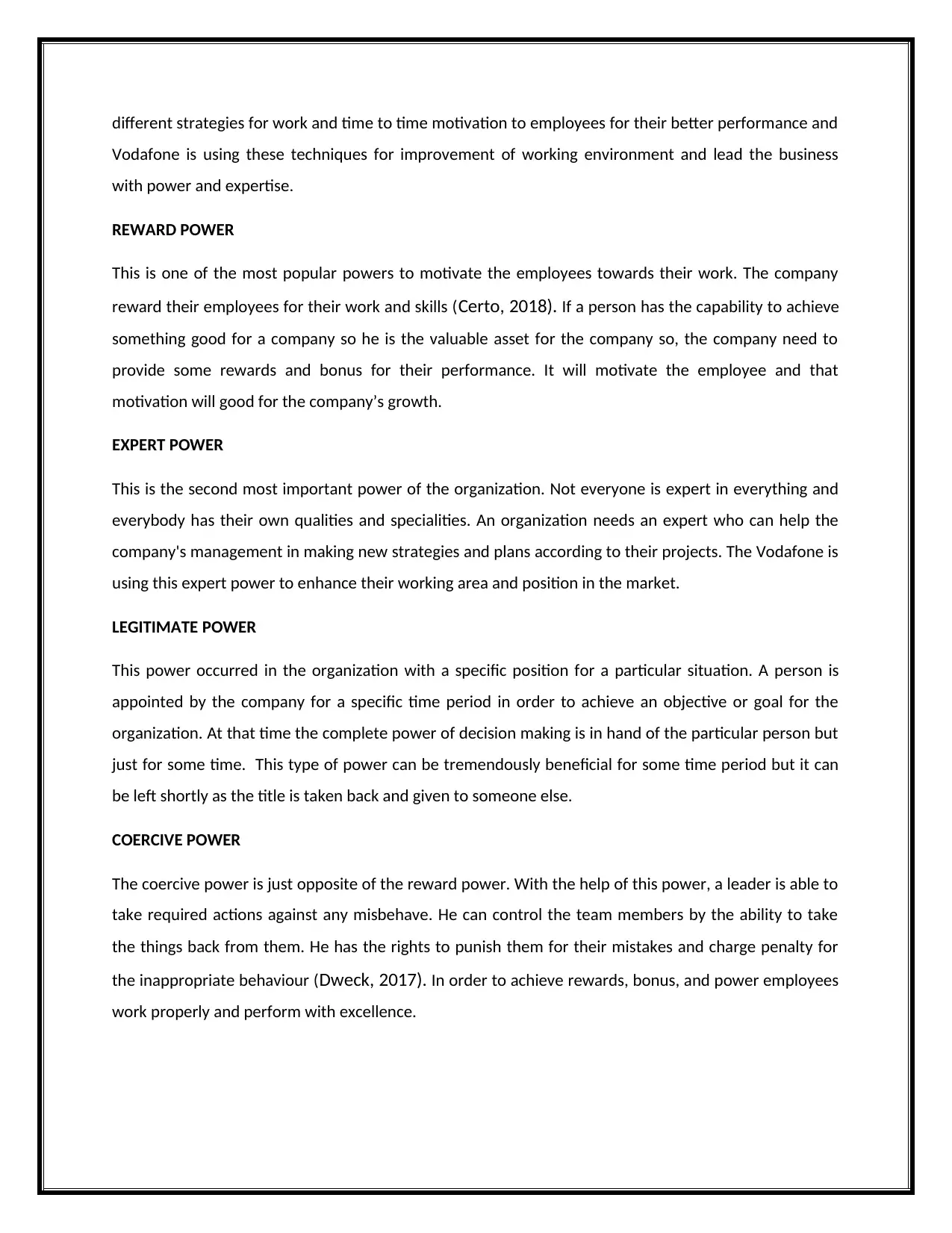
different strategies for work and time to time motivation to employees for their better performance and
Vodafone is using these techniques for improvement of working environment and lead the business
with power and expertise.
REWARD POWER
This is one of the most popular powers to motivate the employees towards their work. The company
reward their employees for their work and skills (Certo, 2018). If a person has the capability to achieve
something good for a company so he is the valuable asset for the company so, the company need to
provide some rewards and bonus for their performance. It will motivate the employee and that
motivation will good for the company’s growth.
EXPERT POWER
This is the second most important power of the organization. Not everyone is expert in everything and
everybody has their own qualities and specialities. An organization needs an expert who can help the
company's management in making new strategies and plans according to their projects. The Vodafone is
using this expert power to enhance their working area and position in the market.
LEGITIMATE POWER
This power occurred in the organization with a specific position for a particular situation. A person is
appointed by the company for a specific time period in order to achieve an objective or goal for the
organization. At that time the complete power of decision making is in hand of the particular person but
just for some time. This type of power can be tremendously beneficial for some time period but it can
be left shortly as the title is taken back and given to someone else.
COERCIVE POWER
The coercive power is just opposite of the reward power. With the help of this power, a leader is able to
take required actions against any misbehave. He can control the team members by the ability to take
the things back from them. He has the rights to punish them for their mistakes and charge penalty for
the inappropriate behaviour (Dweck, 2017). In order to achieve rewards, bonus, and power employees
work properly and perform with excellence.
Vodafone is using these techniques for improvement of working environment and lead the business
with power and expertise.
REWARD POWER
This is one of the most popular powers to motivate the employees towards their work. The company
reward their employees for their work and skills (Certo, 2018). If a person has the capability to achieve
something good for a company so he is the valuable asset for the company so, the company need to
provide some rewards and bonus for their performance. It will motivate the employee and that
motivation will good for the company’s growth.
EXPERT POWER
This is the second most important power of the organization. Not everyone is expert in everything and
everybody has their own qualities and specialities. An organization needs an expert who can help the
company's management in making new strategies and plans according to their projects. The Vodafone is
using this expert power to enhance their working area and position in the market.
LEGITIMATE POWER
This power occurred in the organization with a specific position for a particular situation. A person is
appointed by the company for a specific time period in order to achieve an objective or goal for the
organization. At that time the complete power of decision making is in hand of the particular person but
just for some time. This type of power can be tremendously beneficial for some time period but it can
be left shortly as the title is taken back and given to someone else.
COERCIVE POWER
The coercive power is just opposite of the reward power. With the help of this power, a leader is able to
take required actions against any misbehave. He can control the team members by the ability to take
the things back from them. He has the rights to punish them for their mistakes and charge penalty for
the inappropriate behaviour (Dweck, 2017). In order to achieve rewards, bonus, and power employees
work properly and perform with excellence.
Paraphrase This Document
Need a fresh take? Get an instant paraphrase of this document with our AI Paraphraser
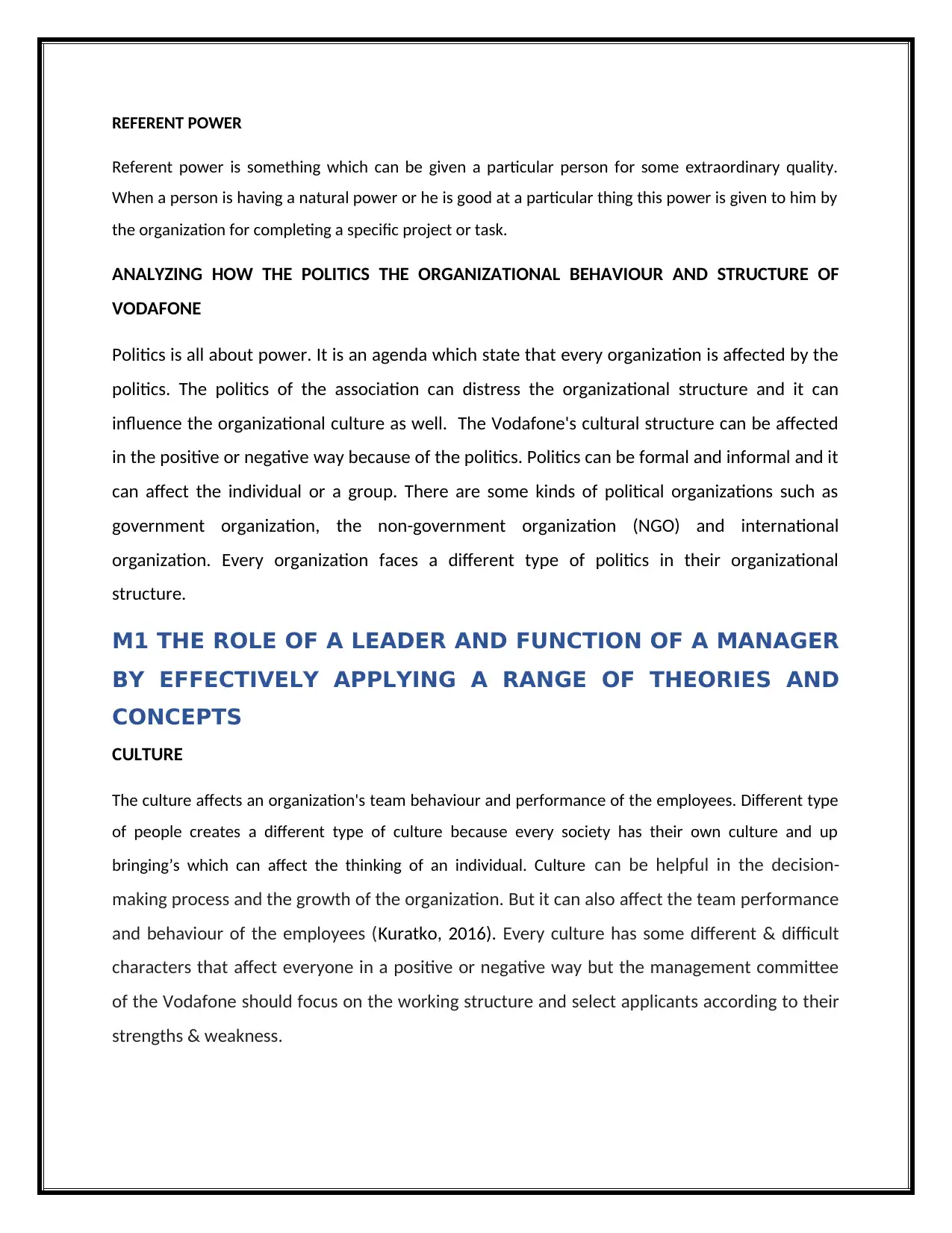
REFERENT POWER
Referent power is something which can be given a particular person for some extraordinary quality.
When a person is having a natural power or he is good at a particular thing this power is given to him by
the organization for completing a specific project or task.
ANALYZING HOW THE POLITICS THE ORGANIZATIONAL BEHAVIOUR AND STRUCTURE OF
VODAFONE
Politics is all about power. It is an agenda which state that every organization is affected by the
politics. The politics of the association can distress the organizational structure and it can
influence the organizational culture as well. The Vodafone's cultural structure can be affected
in the positive or negative way because of the politics. Politics can be formal and informal and it
can affect the individual or a group. There are some kinds of political organizations such as
government organization, the non-government organization (NGO) and international
organization. Every organization faces a different type of politics in their organizational
structure.
M1 THE ROLE OF A LEADER AND FUNCTION OF A MANAGER
BY EFFECTIVELY APPLYING A RANGE OF THEORIES AND
CONCEPTS
CULTURE
The culture affects an organization's team behaviour and performance of the employees. Different type
of people creates a different type of culture because every society has their own culture and up
bringing’s which can affect the thinking of an individual. Culture can be helpful in the decision-
making process and the growth of the organization. But it can also affect the team performance
and behaviour of the employees (Kuratko, 2016). Every culture has some different & difficult
characters that affect everyone in a positive or negative way but the management committee
of the Vodafone should focus on the working structure and select applicants according to their
strengths & weakness.
Referent power is something which can be given a particular person for some extraordinary quality.
When a person is having a natural power or he is good at a particular thing this power is given to him by
the organization for completing a specific project or task.
ANALYZING HOW THE POLITICS THE ORGANIZATIONAL BEHAVIOUR AND STRUCTURE OF
VODAFONE
Politics is all about power. It is an agenda which state that every organization is affected by the
politics. The politics of the association can distress the organizational structure and it can
influence the organizational culture as well. The Vodafone's cultural structure can be affected
in the positive or negative way because of the politics. Politics can be formal and informal and it
can affect the individual or a group. There are some kinds of political organizations such as
government organization, the non-government organization (NGO) and international
organization. Every organization faces a different type of politics in their organizational
structure.
M1 THE ROLE OF A LEADER AND FUNCTION OF A MANAGER
BY EFFECTIVELY APPLYING A RANGE OF THEORIES AND
CONCEPTS
CULTURE
The culture affects an organization's team behaviour and performance of the employees. Different type
of people creates a different type of culture because every society has their own culture and up
bringing’s which can affect the thinking of an individual. Culture can be helpful in the decision-
making process and the growth of the organization. But it can also affect the team performance
and behaviour of the employees (Kuratko, 2016). Every culture has some different & difficult
characters that affect everyone in a positive or negative way but the management committee
of the Vodafone should focus on the working structure and select applicants according to their
strengths & weakness.
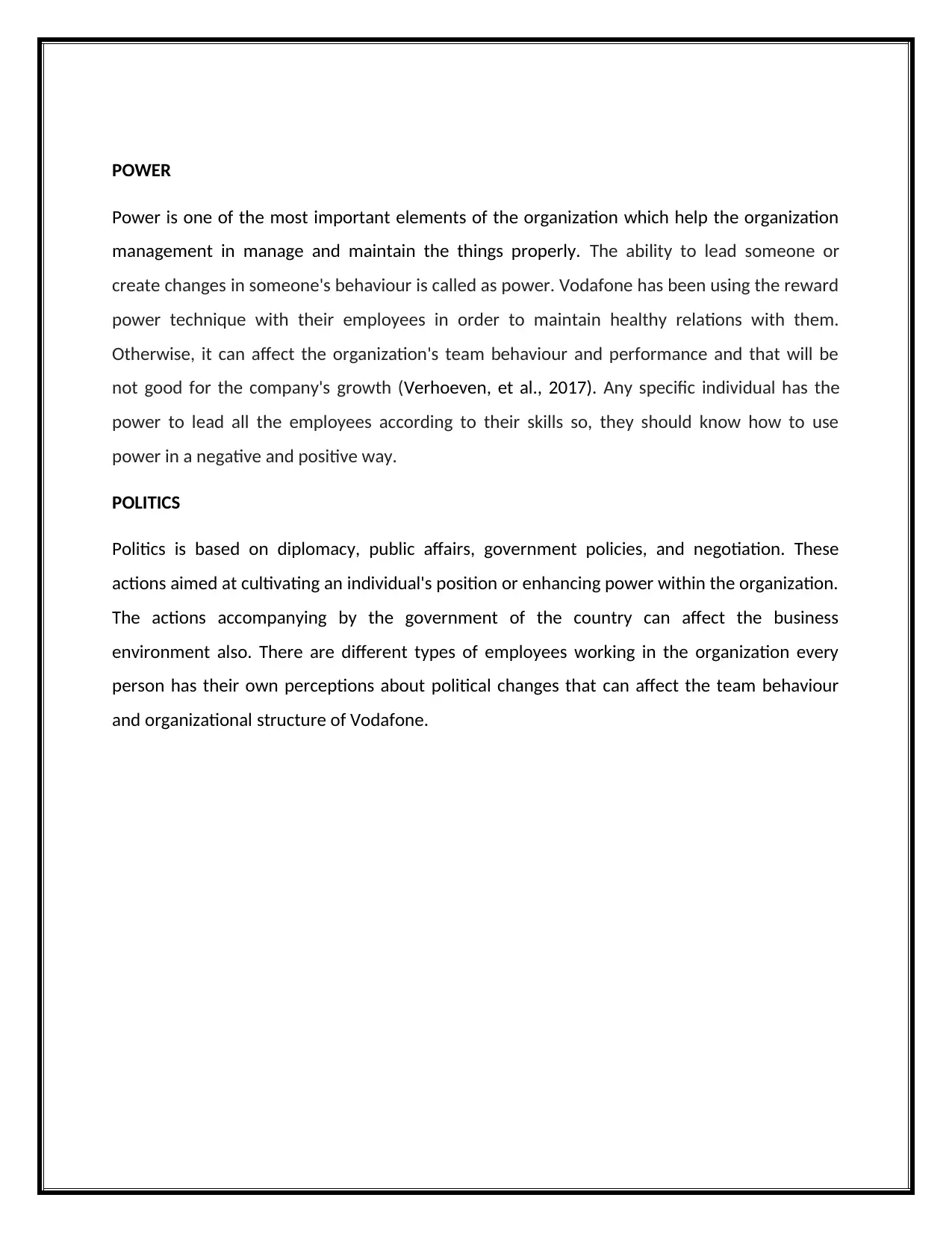
POWER
Power is one of the most important elements of the organization which help the organization
management in manage and maintain the things properly. The ability to lead someone or
create changes in someone's behaviour is called as power. Vodafone has been using the reward
power technique with their employees in order to maintain healthy relations with them.
Otherwise, it can affect the organization's team behaviour and performance and that will be
not good for the company's growth (Verhoeven, et al., 2017). Any specific individual has the
power to lead all the employees according to their skills so, they should know how to use
power in a negative and positive way.
POLITICS
Politics is based on diplomacy, public affairs, government policies, and negotiation. These
actions aimed at cultivating an individual's position or enhancing power within the organization.
The actions accompanying by the government of the country can affect the business
environment also. There are different types of employees working in the organization every
person has their own perceptions about political changes that can affect the team behaviour
and organizational structure of Vodafone.
Power is one of the most important elements of the organization which help the organization
management in manage and maintain the things properly. The ability to lead someone or
create changes in someone's behaviour is called as power. Vodafone has been using the reward
power technique with their employees in order to maintain healthy relations with them.
Otherwise, it can affect the organization's team behaviour and performance and that will be
not good for the company's growth (Verhoeven, et al., 2017). Any specific individual has the
power to lead all the employees according to their skills so, they should know how to use
power in a negative and positive way.
POLITICS
Politics is based on diplomacy, public affairs, government policies, and negotiation. These
actions aimed at cultivating an individual's position or enhancing power within the organization.
The actions accompanying by the government of the country can affect the business
environment also. There are different types of employees working in the organization every
person has their own perceptions about political changes that can affect the team behaviour
and organizational structure of Vodafone.
⊘ This is a preview!⊘
Do you want full access?
Subscribe today to unlock all pages.

Trusted by 1+ million students worldwide
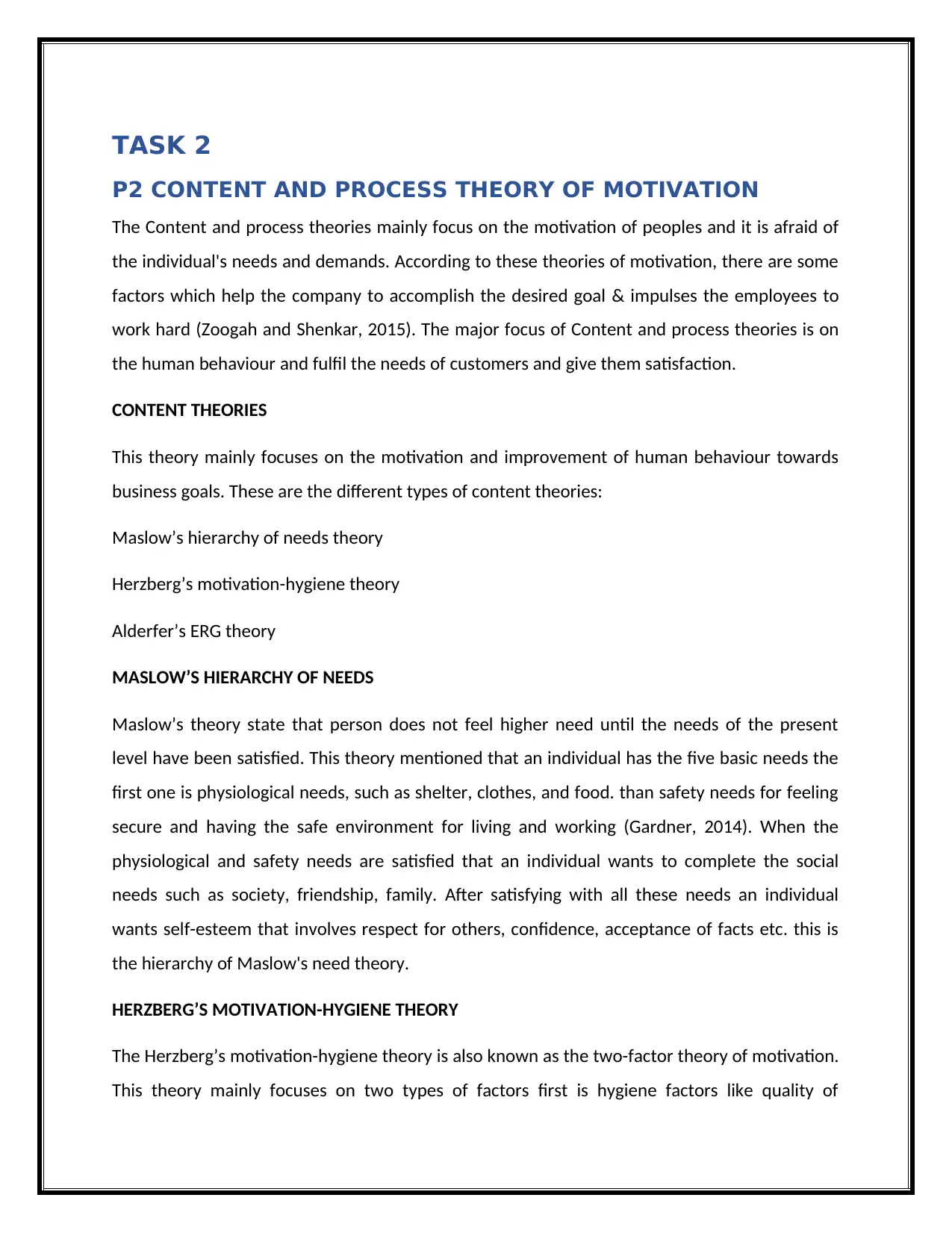
TASK 2
P2 CONTENT AND PROCESS THEORY OF MOTIVATION
The Content and process theories mainly focus on the motivation of peoples and it is afraid of
the individual's needs and demands. According to these theories of motivation, there are some
factors which help the company to accomplish the desired goal & impulses the employees to
work hard (Zoogah and Shenkar, 2015). The major focus of Content and process theories is on
the human behaviour and fulfil the needs of customers and give them satisfaction.
CONTENT THEORIES
This theory mainly focuses on the motivation and improvement of human behaviour towards
business goals. These are the different types of content theories:
Maslow’s hierarchy of needs theory
Herzberg’s motivation-hygiene theory
Alderfer’s ERG theory
MASLOW’S HIERARCHY OF NEEDS
Maslow’s theory state that person does not feel higher need until the needs of the present
level have been satisfied. This theory mentioned that an individual has the five basic needs the
first one is physiological needs, such as shelter, clothes, and food. than safety needs for feeling
secure and having the safe environment for living and working (Gardner, 2014). When the
physiological and safety needs are satisfied that an individual wants to complete the social
needs such as society, friendship, family. After satisfying with all these needs an individual
wants self-esteem that involves respect for others, confidence, acceptance of facts etc. this is
the hierarchy of Maslow's need theory.
HERZBERG’S MOTIVATION-HYGIENE THEORY
The Herzberg’s motivation-hygiene theory is also known as the two-factor theory of motivation.
This theory mainly focuses on two types of factors first is hygiene factors like quality of
P2 CONTENT AND PROCESS THEORY OF MOTIVATION
The Content and process theories mainly focus on the motivation of peoples and it is afraid of
the individual's needs and demands. According to these theories of motivation, there are some
factors which help the company to accomplish the desired goal & impulses the employees to
work hard (Zoogah and Shenkar, 2015). The major focus of Content and process theories is on
the human behaviour and fulfil the needs of customers and give them satisfaction.
CONTENT THEORIES
This theory mainly focuses on the motivation and improvement of human behaviour towards
business goals. These are the different types of content theories:
Maslow’s hierarchy of needs theory
Herzberg’s motivation-hygiene theory
Alderfer’s ERG theory
MASLOW’S HIERARCHY OF NEEDS
Maslow’s theory state that person does not feel higher need until the needs of the present
level have been satisfied. This theory mentioned that an individual has the five basic needs the
first one is physiological needs, such as shelter, clothes, and food. than safety needs for feeling
secure and having the safe environment for living and working (Gardner, 2014). When the
physiological and safety needs are satisfied that an individual wants to complete the social
needs such as society, friendship, family. After satisfying with all these needs an individual
wants self-esteem that involves respect for others, confidence, acceptance of facts etc. this is
the hierarchy of Maslow's need theory.
HERZBERG’S MOTIVATION-HYGIENE THEORY
The Herzberg’s motivation-hygiene theory is also known as the two-factor theory of motivation.
This theory mainly focuses on two types of factors first is hygiene factors like quality of
Paraphrase This Document
Need a fresh take? Get an instant paraphrase of this document with our AI Paraphraser
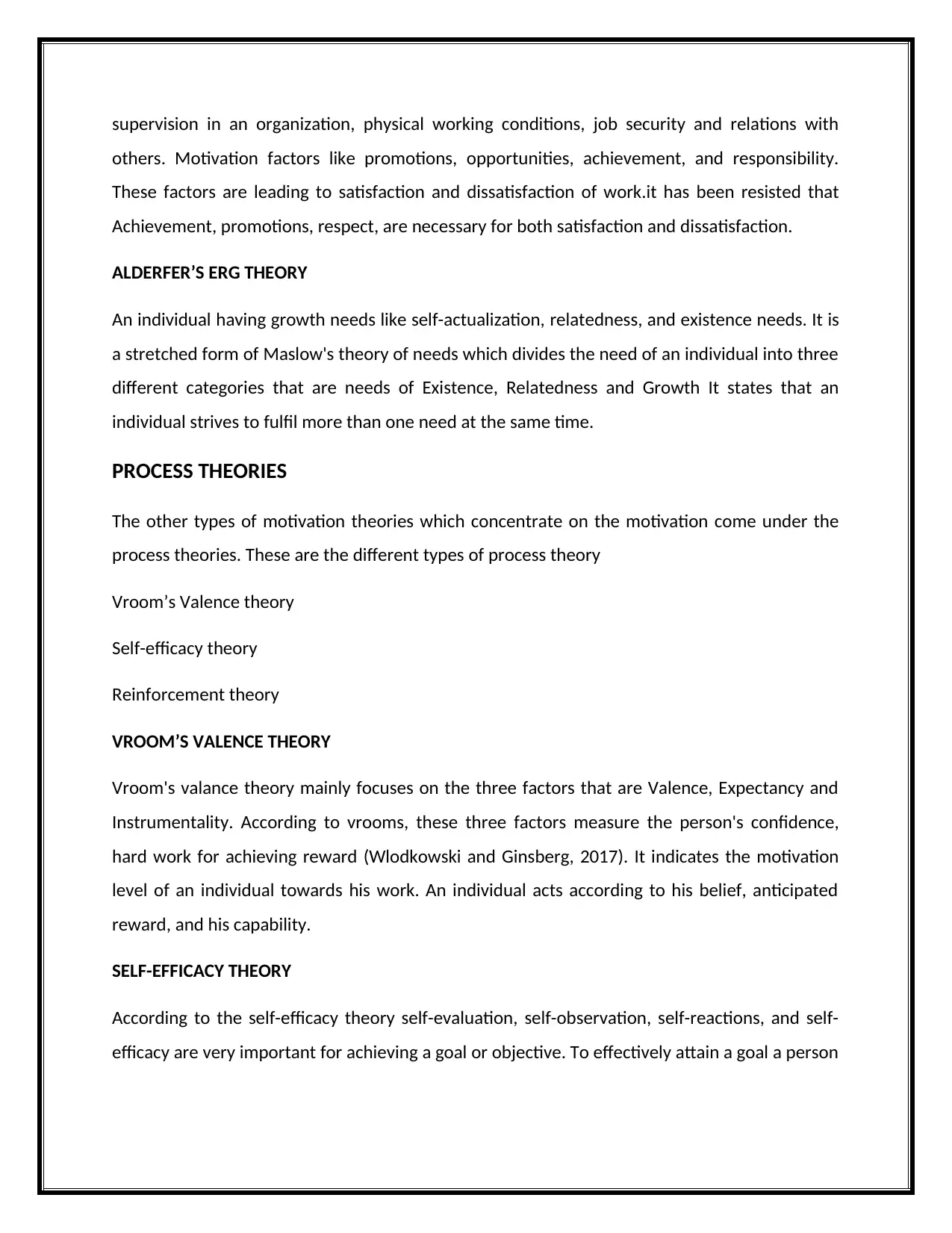
supervision in an organization, physical working conditions, job security and relations with
others. Motivation factors like promotions, opportunities, achievement, and responsibility.
These factors are leading to satisfaction and dissatisfaction of work.it has been resisted that
Achievement, promotions, respect, are necessary for both satisfaction and dissatisfaction.
ALDERFER’S ERG THEORY
An individual having growth needs like self-actualization, relatedness, and existence needs. It is
a stretched form of Maslow's theory of needs which divides the need of an individual into three
different categories that are needs of Existence, Relatedness and Growth It states that an
individual strives to fulfil more than one need at the same time.
PROCESS THEORIES
The other types of motivation theories which concentrate on the motivation come under the
process theories. These are the different types of process theory
Vroom’s Valence theory
Self-efficacy theory
Reinforcement theory
VROOM’S VALENCE THEORY
Vroom's valance theory mainly focuses on the three factors that are Valence, Expectancy and
Instrumentality. According to vrooms, these three factors measure the person's confidence,
hard work for achieving reward (Wlodkowski and Ginsberg, 2017). It indicates the motivation
level of an individual towards his work. An individual acts according to his belief, anticipated
reward, and his capability.
SELF-EFFICACY THEORY
According to the self-efficacy theory self-evaluation, self-observation, self-reactions, and self-
efficacy are very important for achieving a goal or objective. To effectively attain a goal a person
others. Motivation factors like promotions, opportunities, achievement, and responsibility.
These factors are leading to satisfaction and dissatisfaction of work.it has been resisted that
Achievement, promotions, respect, are necessary for both satisfaction and dissatisfaction.
ALDERFER’S ERG THEORY
An individual having growth needs like self-actualization, relatedness, and existence needs. It is
a stretched form of Maslow's theory of needs which divides the need of an individual into three
different categories that are needs of Existence, Relatedness and Growth It states that an
individual strives to fulfil more than one need at the same time.
PROCESS THEORIES
The other types of motivation theories which concentrate on the motivation come under the
process theories. These are the different types of process theory
Vroom’s Valence theory
Self-efficacy theory
Reinforcement theory
VROOM’S VALENCE THEORY
Vroom's valance theory mainly focuses on the three factors that are Valence, Expectancy and
Instrumentality. According to vrooms, these three factors measure the person's confidence,
hard work for achieving reward (Wlodkowski and Ginsberg, 2017). It indicates the motivation
level of an individual towards his work. An individual acts according to his belief, anticipated
reward, and his capability.
SELF-EFFICACY THEORY
According to the self-efficacy theory self-evaluation, self-observation, self-reactions, and self-
efficacy are very important for achieving a goal or objective. To effectively attain a goal a person
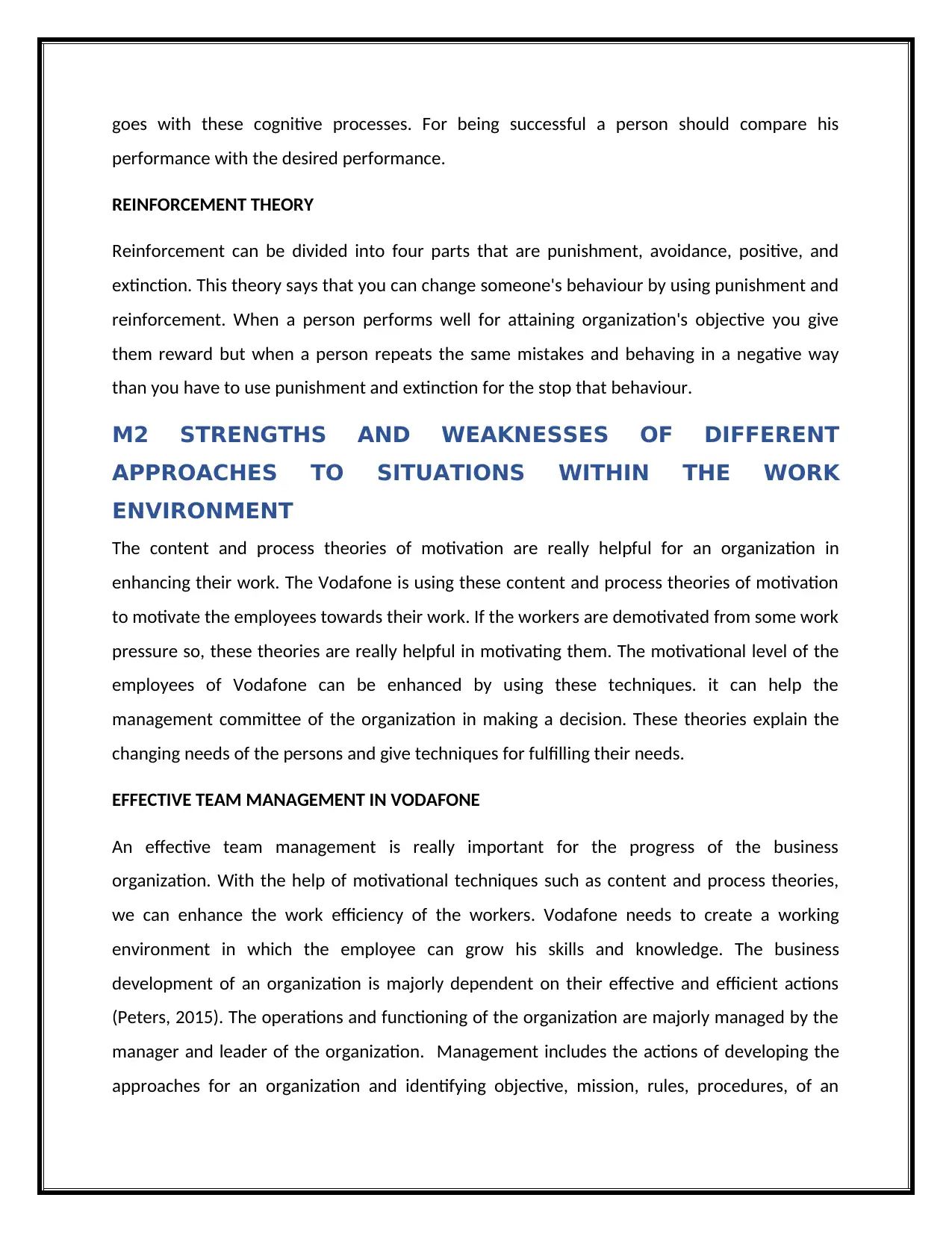
goes with these cognitive processes. For being successful a person should compare his
performance with the desired performance.
REINFORCEMENT THEORY
Reinforcement can be divided into four parts that are punishment, avoidance, positive, and
extinction. This theory says that you can change someone's behaviour by using punishment and
reinforcement. When a person performs well for attaining organization's objective you give
them reward but when a person repeats the same mistakes and behaving in a negative way
than you have to use punishment and extinction for the stop that behaviour.
M2 STRENGTHS AND WEAKNESSES OF DIFFERENT
APPROACHES TO SITUATIONS WITHIN THE WORK
ENVIRONMENT
The content and process theories of motivation are really helpful for an organization in
enhancing their work. The Vodafone is using these content and process theories of motivation
to motivate the employees towards their work. If the workers are demotivated from some work
pressure so, these theories are really helpful in motivating them. The motivational level of the
employees of Vodafone can be enhanced by using these techniques. it can help the
management committee of the organization in making a decision. These theories explain the
changing needs of the persons and give techniques for fulfilling their needs.
EFFECTIVE TEAM MANAGEMENT IN VODAFONE
An effective team management is really important for the progress of the business
organization. With the help of motivational techniques such as content and process theories,
we can enhance the work efficiency of the workers. Vodafone needs to create a working
environment in which the employee can grow his skills and knowledge. The business
development of an organization is majorly dependent on their effective and efficient actions
(Peters, 2015). The operations and functioning of the organization are majorly managed by the
manager and leader of the organization. Management includes the actions of developing the
approaches for an organization and identifying objective, mission, rules, procedures, of an
performance with the desired performance.
REINFORCEMENT THEORY
Reinforcement can be divided into four parts that are punishment, avoidance, positive, and
extinction. This theory says that you can change someone's behaviour by using punishment and
reinforcement. When a person performs well for attaining organization's objective you give
them reward but when a person repeats the same mistakes and behaving in a negative way
than you have to use punishment and extinction for the stop that behaviour.
M2 STRENGTHS AND WEAKNESSES OF DIFFERENT
APPROACHES TO SITUATIONS WITHIN THE WORK
ENVIRONMENT
The content and process theories of motivation are really helpful for an organization in
enhancing their work. The Vodafone is using these content and process theories of motivation
to motivate the employees towards their work. If the workers are demotivated from some work
pressure so, these theories are really helpful in motivating them. The motivational level of the
employees of Vodafone can be enhanced by using these techniques. it can help the
management committee of the organization in making a decision. These theories explain the
changing needs of the persons and give techniques for fulfilling their needs.
EFFECTIVE TEAM MANAGEMENT IN VODAFONE
An effective team management is really important for the progress of the business
organization. With the help of motivational techniques such as content and process theories,
we can enhance the work efficiency of the workers. Vodafone needs to create a working
environment in which the employee can grow his skills and knowledge. The business
development of an organization is majorly dependent on their effective and efficient actions
(Peters, 2015). The operations and functioning of the organization are majorly managed by the
manager and leader of the organization. Management includes the actions of developing the
approaches for an organization and identifying objective, mission, rules, procedures, of an
⊘ This is a preview!⊘
Do you want full access?
Subscribe today to unlock all pages.

Trusted by 1+ million students worldwide
1 out of 26
Related Documents
Your All-in-One AI-Powered Toolkit for Academic Success.
+13062052269
info@desklib.com
Available 24*7 on WhatsApp / Email
![[object Object]](/_next/static/media/star-bottom.7253800d.svg)
Unlock your academic potential
Copyright © 2020–2026 A2Z Services. All Rights Reserved. Developed and managed by ZUCOL.





